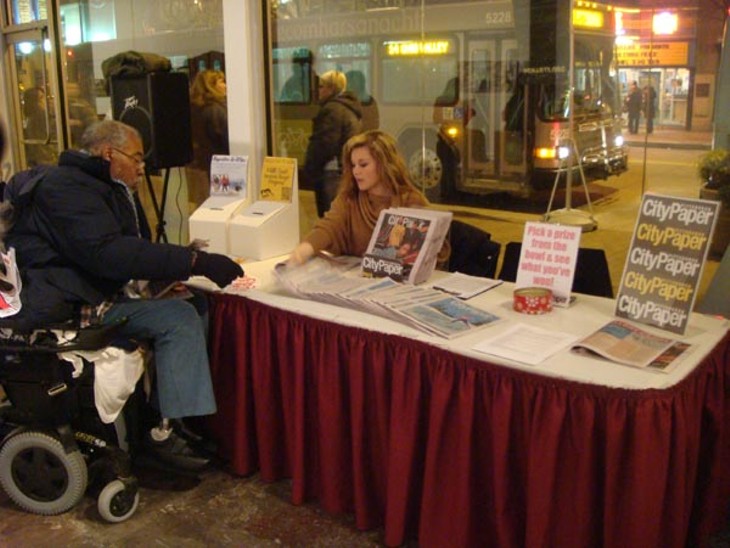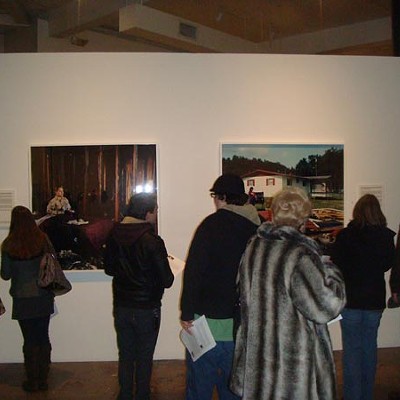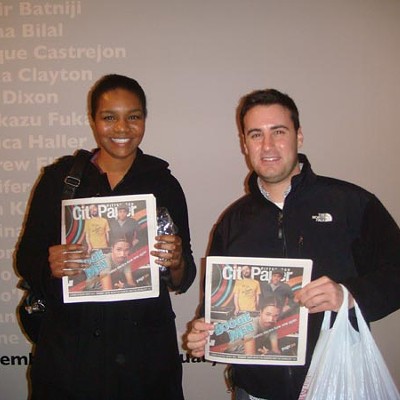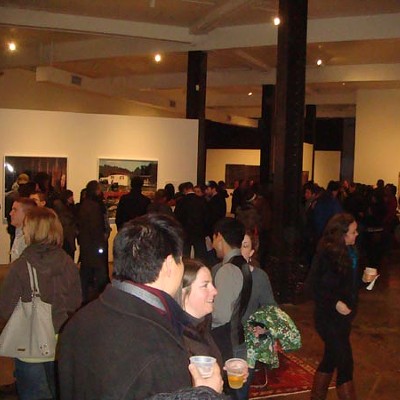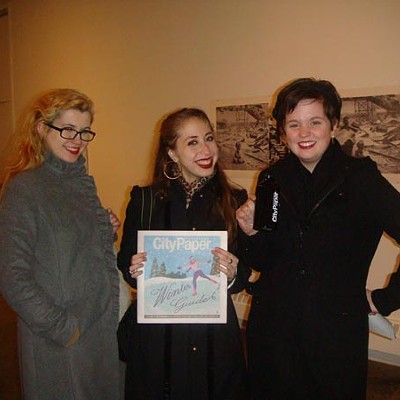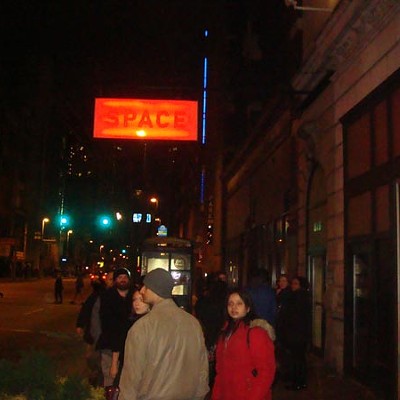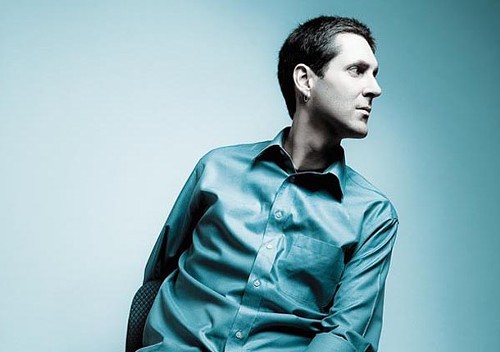Tuesday, January 31, 2012
Today in current events: A battle between political rivals over who gets credit for saving electricity.
(And yes, "current events" was an electricity pun. There will be others; consider this your trigger warning.)
At 11:42 this morning, Pittsburgh City Councilor Bill Peduto's office sent out notice of a press conference tonight in Shadyside. Titled "Pittsburgh's Lighting Future," the release opens by trumpeting, "After three years of work, the City has begun to install new LED streetlights in all of the City's business districts." And this very evening, Peduto is holding an event that marks "the beginning of the installation of 3,000 new LED lights in the City's business districts." Peduto also will announce the launch of www.pittsburghledproject.com, which offers a brief recap of the deliberations.
Peduto has long been geeked out by LED lights, which use less electricity and have longer lives than other bulbs. And his release recounts the timeline which led up to today's event, ultimately raising the question "How many post-agenda meetings does it take to change a light bulb?" In Peduto's telling, the story begins in 2005, with the founding of the Climate Action Plan Task Force. It details numerous council actions, partnerships with universities, and other historic events. And Mayor Luke Ravenstahl, apparently, plays no role whatsoever; his name goes unmentioned in the release's recounting.
Peduto is, of course, a likely challenger when Ravenstahl is up for reelection in 2013. And lest you think Ravenstahl is content to dwell in Peduto's shadow ... the mayor's office sent out this press release at 3:33 p.m. this afternoon ... less than four hours after Peduto's statement went out:
MAYOR TO INSTALL THE WEST END COMMUNITY'S FIRST DECORATIVE LED LIGHT FIXTURE
Mayor Luke Ravenstahl ... tomorrow will install the first decorative LED light in the City’s West End business district in celebration of the $2.9 million streetlight conversion project set to save $110,000 taxpayer dollars ... The streetlight conversion project, launched by Mayor Ravenstahl in 2009, will convert over 3,500 streetlights in each City business district to energy efficient Light Emitting Diode (LED) lights, which will make business districts safer and better-lit as residents and visitors visit our local shops and restaurants.
You caught it, didn't you? That part where Ravenstahl's release asserts that the LED conversion was "launched by Mayor Ravenstahl in 2009"? Ravenstahl dates the dawn of the LED project to August of that year, in which "the Mayor launched a pilot project in the South Side neighborhood allowing residents to choose which of several green technologies provided the best quality of light."
That pilot project did take place (though it's not mentioned in Peduto's release). But the record shows, in fact, that a demonstration project involving LED lights was kicked off along Walnut Street the year before: "In May of 2008, the City of Pittsburgh installed a LED street light pilot project using existing globe lights on one side of Walnut Street in Shadyside."
(For those keeping score at home, note too that Ravenstahl's event is happening in the West End, turf held by an ally on council, Theresa Kail-Smith. Peduto's event, naturally, is happening in his own district.)
And by the time Ravenstahl's release went out, mayoral spokespeople had already been undermining Peduto's role, claiming the whole thing "was a mayor's office initiative."
Peduto and Ravenstahl have been competing for bragging rights on the LED issue for nigh on three years now. At about this time in 2009, Peduto was pushing LEDs as the wave of the future; Team Ravenstahl, by contrast, expressed some doubt about whether "induction lighting or metal halide lighting" might not be better options.
Peduto won that argument in the end, and honestly ... LEDs have been his baby from the beginning. If Peduto weren't contemplating a mayoral run, Ravenstahl might have acknowledged that. Just yesterday, when the mayor's office announced a city bond sale, he did so in the form of a "joint statement" with councilor President Darlene Harris, and Council Finance Chair Ricky Burgess. Both are mayoral allies.
Then again, if Peduto weren't contemplating a mayoral run, his release might have acknowledged that, for example, when council passed the Climate Action Plan he sponsored in 2008, the mayor approved it.
This is the kind of debate you don't want to take sides in. Had either of these guys been on the wrong side of the issue, probably neither of these press conference would be taking place. Peduto was the first to see the light, but without support from the administration officials in charge of the Public Works and other departments, the switch could never have been thrown. So now it's just a matter of who gets the best PR spin: Peduto's presser will be first, but then Ravenstahl "will be lifted in a bucket truck to install the new decorative LED light bulb." So there's that.
The mayoral primary is more than a year away. In the meantime, you can expect further debates that will, as they say, shed more heat than light.
Tags: Slag Heap
During his tenure as superintendent of the Pittsburgh Public Schools, Mark Roosevelt was sometimes criticized for spending money too liberally. Now, as president of Antioch College in Yellow Spring, Ohio, he's giving it away.
On Jan. 17, Antioch announced that the small liberal arts college would provide four-year, full scholarships for every student who enrolls in the school over the next three years. Since tuition at Antioch is currently $26,500, that makes each complete scholarship worth a total of $106,000.
"We don't want economics to be an impediment to a high-quality liberal arts education," Roosevelt said in a statement posted on Antioch's website. "By providing four year, full-tuition scholarships, we make attending Antioch College a realistic option for the best and brightest students, regardless of their family's economic situation."
How is this possible?
Antioch is trying to resurrect itself, after being closed down in 2008 due to dwindling enrollment and other problems. And to reestablish itself, it needs students. So the school is using its $25 million endowment to help lure college applicants to the tiny Ohio campus. (If you're wooed by this offer, the admission deadline is Feb. 15.)
That might sound odd for a school that has closed four times in its history. After the school's 2008 shutdown, an alumni group purchased all of the school's assets the next year to help rebuild the college. In need of a reform-minded leader, the school hired Roosevelt in December 2010 -- as the city schools superintendent was five years into a controversial overhaul of Pittsburgh's school district.
The college reopened in October, with a roster of 35 freshmen. Those students are being taught by a staff of a half-dozen teachers.
Roosevelt, who left Pittsburgh with a mix of high and low marks on his report card, earned lots of praise for shuttering dozens of schools during his tenure, efforts his supporters claimed helped shore up the district's finances. But since his abrupt departure at the end of 2010, some have questioned whether his reforms were really so fiscally responsible.
Roosevelt's successor, Linda Lane, is now battling a $68 million budget deficit. While many blame that on cuts in support from the federal government, Roosevelt's critics argue that his reforms added to the fiscal dilemma, contending that the reforms were destined to bankrupt the district in the long run. And Roosevelt hit the road, they say, right before the budget problems blew up.
But while it's debatable what Roosevelt did to the district's finances, even his critics must admit that he helped keep lots of Pittsburgh families from taking on debt to send their children to college. In 2007, Roosevelt joined Mayor Luke Ravenstahl to establish the Pittsburgh Promise, which offers high school graduates up to $40,000 in scholarship money if they maintain at least a 2.5 GPA.
Roosevelt, apparently, has a thing for scholarships. And now educators in two states better hope they work.
Tags: Slag Heap
Monday, January 30, 2012
Art. Music. Dance. Architecture. Film. Networking. Fun. FREE!
Pittsburgh City Paper was at the Gallery Crawl Friday night from 5-8 giving away prizes and having a great time! The Gallery Crawl is a free quarterly showcase of art and entertainment in the heart of the Cultural District. All events take place at a variety of galleries and spaces and are FREE and open to the public. The event is ongoing between 5:30 and 9:00 pm, and patrons may start at any location.
Upcoming Gallery Crawl dates:
April 27
July 13
September 28
The Gallery Crawl is A Production of Pittsburgh Cultural Trust.
Greetings!
This week's MP3 Monday comes from local singer/songwriter Ben Hackett, who's about to release his second album in more than 15 years of performing. The Blue Hour, a 10-song CD, comes out this Friday, with a release show at Club Cafe. Show starts at 7 p.m.; Chelsea Jones opens. Tickets are $12. Stream and/or download the third track off the album, "Broken," below!
Sorry, download link expired!
Tags: MP3 Monday , Ben Hackett , FFW>> , Image
In one of the stranger bookings in town so far this year, Snoop Dogg — Wiz Khalifa's co-star in the upcoming High School, and friend of "Luke Luke Ravenstahl," is playing at Altar Bar tonight. It's an intimate booking for the superstar, and as of right now is not yet sold out. Tickets are $60 in advance and $65 at the door; all the info is available here. I'll just leave it at that, and spare you all the "dorky white guy talking like Snoop" stuff.
Tags: Snoop Dogg , FFW>>
Sunday, January 29, 2012
We spoke with Nicolay, a Grammy-nominated producer and instrumentalist and one half of the duo Foreign Exchange, in advance of his show at Shadow Lounge Tuesday.
I’ve read that you’ve worked with guitarist Chris Berner through your Foreign Exchange project, and in that project you were making more hip-hop and electronic stuff. This EP sounds a lot more classic, like you can lounge to it, whereas Foreign Exchange stuff kinda makes you wanna hit the dance floor. Can you tell me a little bit about how this EP came to fruition? What drove you, personally, into this smooth jazz sound?
I’ve always been a very big jazz fan. You can definitely also hear that in a lot of the Foreign Exchange records. But it never really went beyond being an influence. I’ve always dreamed of doing an actual “jazz” project, but not really claiming it to be jazz as much as it is just my interpretation of it. As you say, I’ve really tried to come up with a very classic sound where everything is played on actual instruments. There’s no sequencing or computers or any of that stuff involved. In a lot of ways it was about a desire for me to further challenge myself and really look for depth in a direction we don’t normally go in.
I know that you’re a classically trained musician; was jazz a large part of that education?
Not really. I’ve studied music in general, both in terms of the theory of it as well as to practice actual composition and playing. And with jazz it’s always been something I’ve been very familiar with never truly dabbled in it. I don’t really see myself as a “jazz musician,” and I would never really claim that.
In general I like various genres. I like to sorta kinda give my take on it, whether it’s dance music or hip-hop or jazz. So it’s not something that I’ve really always done or have been taught to do. This is more just like me kinda bein’ like a rhinoceros in a porcelain cabinet. Just tryin’ to hold my own in front of people who actually are trained and are jazz musicians.
Can you tell me a little bit about the creative process and what it was like working with the Hot at Nights on this EP?
Well, it’s real cool because, as I said earlier, in a lot of ways it was very different from the record making process as we do with the Foreign Exchange — which is Phonte, my partner, and myself — and we, in reality, never collaborate at the same moment in the same room. It’s always just a back and forth of our, kind of 50% of the total puzzle. In this project it was actually 4 guys in a room set up with headphones and instruments and it was a very in-the-moment thing. We did it in one day.
The whole thing in one day?!
Yeah, I drove up to Durham and we unloaded the stuff and we checked the sound and we were off and we didn’t really stop until late, late. But it was still one day. It was really part of the challenge for us to not allow any of the luxuries you would normally have in the recording process: fixing mistakes, over-dubbing yourself. A lot of those things we felt it would be really cool if we were really put ourselves in the hands of the moment. Almost like as a Dogme, ya know, we wanted to do that and so it was honestly a great experience because you’re directly faced with the people who make the music at that moment. And so if things go wrong, they go wrong horribly, but if they go right, they go right in a way that you can’t predict up front. You can’t rehearse for that; those are improvisational moments that come together right there. That’s why I love the project, more than anything.
That’s kind of a blind process there. Like you said, you don’t see the other musician face-to-face. Do you think that that takes away? Do you think that there’s a little bit more humanness to creating music live as opposed to sending it over e-mail back-and-forth?
I actually have the theory that it’s the other way around. That because we’re not in the same room together we’re not faced with the same sort of inhibitions that people have when they make music together. Even the most gifted and talented know about just inhibitions. I feel strongly that when Phonte and myself, for instance, create a song, we’re really able to put 100% of ourselves into it rather than have to come up with a sort of compromise or any sort of collaborative process because we’re in the same room. The result, I think the music actually has a passion to it that you wouldn’t really get if you were in the same room. For instance if you say 'I’m gonna write this song and really put myself out there but there’s another dude in the room who’s lookin’ and if I put this out he’s gonna laugh at me,' or whatever. That’s not a factor in our working process and I think it has honestly helped us more than it has hindered us.
Your bio notes that your influences range from Stevie Wonder to Neil Young and we’ve already talked about your classical background and your hip-hop and R&B work; so you’re coming at music-making with so many different sounds in your repertoire. I’m curious: When you’re making an album do you hunker down in your studio and surround yourself with particular records or artists?
It’s not something that we predestined, if you will, before we start a new project. I think that every project that I do or we do in a group setting, they’re all kind of portraits of us in moments in time. There’s a lot of times where you’ll find yourselves particularly influenced by one artist or one sub-style of music or even genre. For instance, when Phonte and myself worked on Authenticity, both of us listened to lots of Neil Young and James Taylor and stuff like that and really wanted to encapsulate that whole 70’s singer-songwriter directness approach of just the song, very stripped down I guess that’s something that we admire about music like that. If you just strip it down to the bare essentials the song is still there.
At moments in time like that we do really listen to certain stuff over and over again and really take away what we feel is something we could use without making style copies or do something that is “throwback.”
Going back into the conversation that we edged into about communicating over the Internet and creating an album that way, you made your first album “Connected” in ’04. That’s a while ago in Internet years. That way of making music is ubiquitous these days. I know so many artists who collaborate with others who live across the country and they do so very easily. Would you say that the Internet has bolstered the quality of work out there or just kind of created a cacophony of too much going on?
I think it’s done both; it’s such a wide broad scope that includes people who would not be in the traditional music industry model and that includes a lot of good and bad. Not only the Internet but computers getting faster and faster and the music technology that came with that, like having a whole studio in a laptop, those kind of things. Obviously they made the threshold that was already like the big speed bump, you had to have money or a label. Especially to be able to record and to record something that would stand up against other stuff. If you’re creative and tech-savvy you can push your stuff further than you could like when we did that first album ‘Cause at that time there wasn’t really anything like Gmail, definitely not Facebook and Twitter, so we kind of pushed it in an “old-fashioned way”: instant messenger and e-mail. Even though I don’t think by any means we were the first, we were definitely in a group of the firsts to complete entire records without ever meeting each other face-to-face. Nowadays that is pretty much how it all works.
NICOLAY with THE HOT AT NIGHTS. 8 p.m. Tue., Jan. 31. Shadow Lounge, 5972 Baum Blvd., East Liberty. $12. 412-363-8277 or shadowlounge.net
Tags: Nicolay , Foreign Exchange , FFW>> , Image
Friday, January 27, 2012
The Port Authority of Allegheny County took the first step down the path to service cuts today, formally approving a public-comment period.
Meanwhile, about 50 people demonstrated outside of the transit agency's Downtown offices today, decrying a proposed 35 percent service reduction that would eliminate 46 bus routes, reduce remaining lines, hike fares and layoff up to 500. Port Authority has proposed the plan as a result of a $64 million budget deficit due to a lack of state funding. The agency cut service by 15 percent last year.
"A 35 percent cut? We might as well not even have transit," said Patrick McMahon, president of Amalgamated Transit Unit (ATU) Local 85, which represents Port Authority operators and mechanics.
The Port Authority, ATU and riders largely pointed to a lack of effort by the state to develop an adequate package for funding transportation across Pennsylvania, from roads to bridges and mass transit. They encouraged the public to lobby legislators and Gov. Tom Corbett's office.
Board members today said they opposed the cuts, but had no other choice.
"We have to plan for the worst, and this is the worst," said board member Guy Mattola. "Cutting 35 percent ... is shameful and a crushing blow to the region's transportation network."
Riders and the authority are trying to drum up support for a package of bills currently pending in State House and Senate that mirror recommendations made my Gov. Tom Corbett's own Transportation Funding Advisory Commission last August.
"We absolutely don't want to make any further reduction in service," said Port Authority CEO Steve Bland. "There are still ways to avoid the cuts. We need a solution from the state."
Corbett has said little publicly and is expected to address it in his February budget address.
"Democrats don't want [the cuts]. Republican legislators definitely think there should be a funding solution," McMahon said. "The governor right now seems to be the one who's holding everything back by refusing to act."
During the board meeting, protesters marched to Gov. Corbett's Downtown office with a pair of shoes. McMahon said that Corbett's stance means "transit riders better get a near pair of sneakers, because they're not going to be able to get the bus."
Public comments will be accepted from Feb. 5 through March 9, and can be submitted online at www.portauthority.org, or by mail to: Port Authority Fare & Service Proposals, Heinz 57 Center, 345 Sixth Ave., Floor 3, Pittsburgh, PA 15222-2527. A public hearing will be held from 8 a.m. to 8 p.m. on Wed., Feb. 29, at the David L. Lawrence Convention Center, Downtown. Individuals wishing to testify may pre-register by calling 412-566-5437.
Tags: Slag Heap
Thursday, January 26, 2012
Layoffs are underway at Education Management Corporation (EDMC), which yesterday told City Paper and other media only that the moves were a "possibility."
Sources at the company's offices in the Strip District and Greentree tell us that EDMC began notifying them of layoffs at around 11 this morning.
EDMC officials have not responded to a request for comment, so it is difficult to gauge the size of the cuts. But insiders say the company's online-education division is being hit hard.
ADDED: EDMC has just released the following statement:
Education Management Corporation (EDMC) announced staffing reductions today at its Online Higher Education operations across multiple positions, departments and locations in Arizona and Pennsylvania which will affect fewer than 2% of its 20,000 employees.
These changes will be effective February 10, 2012 and are not anticipated to have any impact on students.
As disclosed to employees this past Tuesday, EDMC Online Higher Education engaged in a review and evaluation of its operations in order to identify efficiencies and direct resources in ways designed to ensure high quality outcomes remain a top priority for students.
Determinations were based on the current and anticipated future needs of the organization with particular attention paid to current positions that may be redundant, or that could be managed elsewhere.
Outside the Online Higher Education offices on Penn Avenue, taxicabs were waiting for employees and then driving them off. Some ex-workers were consoling each other in the shadow of the Veteran's Bridge, while others marched down to Crystal on Penn, a block away. Outside, two laid-off workers -- who declined to give their names, citing the fact that they were now looking for work -- smoked cigarettes as they watched Yellow Cabs drive by in the rain.
Both worked in admissions; one said that she had "half a mind" to call students she'd recently recruited "and tell them not to bother." EDMC was paying the cab fare, she said, because "now they can afford it." The employees said that more than 70 of some 200 employees at South University online were let go.
While the layoffs were not a shock -- as City Paper previously reported, employees were warned on Tuesday -- the employees said they thought they'd be coming tomorrow. They said they were denied access to their personal possessions and were told that those effects would be boxed up and sent to their homes.
Former employees are saying there doesn't appear to be any rhyme or reason to the layoffs saying that some top performers with higher salaries were let go while others kept their jobs. One worker, who says she received awards for her production, was told she was fired "because of my production."
"I just can't wrap my brain around this," she added.
According to one insider, staffers have been told they will be given severance at a rate of one week for every year of service. However, the employee says that's less than workers were promised at the employee meeting held this past Tuesday, when company officials suggested severance would amount to two weeks of pay for every year of service. All unused sick and vacation time was lost, the employee added.
But not everyone was broken hearted about the results.
"I'm ecstatic," said one former employee outside Crystal on Penn. "I hated that place."
Chris Potter contributed to this report
Tags: Slag Heap
This prison drama marks the debut local production of any work by acclaimed New York playwright Stephen Adly Guirgis; it's actually a fairly early play (from 2000) from the man who wrote the 2011 Broadway hit The Motherfucker with the Hat, starring Chris Rock.
Jesus is in its final week at the New Hazlett Theater, and there's no point retreading the same ground as the positive reviews the show's gotten, including Ted Hoover's for CP.
I'll just note that while there's much to admire about this Derrick Sanders-directed production, it's worth seeing for Guirgis' amazing dialogue alone.
And I don't mean just the fiery exchanges between prisoner and attorney, prisoner and brutal guard, or even the two prisoners at the heart of the play, Angel and Lucius.
Rather, I'd single out one brief, quiet slice of dialogue as evidence of the poetry Guirgis can conjure. It's part of scene where Angel and Lucius meet. Lucius (played by Edwin Lee Gibson, pictured) is a hardened killer who's found God, while Angel (Raúl Castillo) is innocent and despondent, new to prison, awaiting trial.
The two men are in adjacent cells, getting their one hour a day of fresh air. There's a pause in their talk, then Angel says, "... I can't, I can't sleep. I can't in there, do you sleep?"
LUCIUS. I sleep.
ANGEL You breathe an shit?
LUCIUS. Mostly.
Jesus Hopped the A Train continues through Sun., Jan. 29, with four more shows starting tonight at the Hazlett, on the North side.
More info is at barebonesproductions.com.
Tags: Program Notes , Image
Wednesday, January 25, 2012
Public-TV station WQED takes pride in its ongoing coverage of natural-gas drilling in the Marcellus Shale. But a program scheduled for tomorrow night features a panel that critics have charged is unfairly tilted toward gas-drilling interests. The ensuing controversy has apparently led QED to erase critical comments from the Facebook site dedicated to the show.
Titled Managing Marcellus: Energy & The Economy, the roundtable is the latest in a series of programs on the region's natural-gas boom dating back to mid-2010. When it was announced on Jan. 19, the show featured four panelists: Matt Pitzarella, a spokesman for gas-driller Range Resources; Dennis Yablonsky, head of the Allegheny Conference, a group composed of local corporate CEOs; Tom Murphy, who represents the Penn State Marcellus Center for Outreach and Research; and Pennsylvania Department of Environmental Protection Sec. Michael Krancer.
Penn State has major funding ties to the gas industry, and has been criticized by environmental activists as pro-drilling. Michael Krancer represents the administration of Gov. Tom Corbett, is notably friendly toward drilling interests -- and has himself been known to attack researchers whose studies suggest drilling's risks.
Critics, some of whom began posting on the station's Facebook page, quickly pointed out that the panel included no environmentalists or other outspoken critics of gas drilling, which has polluted air and water across the state.
The show "is basically an infomercial for the fracking industry," wrote drilling opponent Mark Knobil in a Monday e-mail calling for protests at QED on the night of the show. ("Fracking" refers to hydrofracturing, the chief method for obtaining gas from deep rock deposits.)
Late Monday, QED announced it had added a fifth panelist: Jan Jarrett, head of Penn Future, an environmental-advocacy group critical of drilling and how it is regulated by the state.
The panel was assembled by QED senior producer Alicia Schisler, who defends the original four-member line-up. "I don't think it was unbalanced with pro-drilling interests to begin with," says Schisler, who was reached by phone earlier today.
Schisler says she had originally sought to include on the panel Kathleen McGinty, the former environmental advisor to Vice President Al Gore who served as DEP secretary under Gov. Ed Rendell. McGinty couldn't be secured, but Schisler says she was already trying to book Penn Future's Jarrett before she learned of complaints about the panel.
Schisler says that QED's coverage of Marcellus Shale issues has been balanced, and indeed, a quick look at the station's online video archives confirms that earlier QED specials have had more diverse representation. A November 2010 "town-hall meeting" included on its panel of four at least two outspoken critics of the gas industry, Duquesne University professor John Stolz and Washington County landowner Stephanie Hallowitch, who said her family's home was made unlivable by nearby drilling activity. A March 2011 expert panel included two drilling opponents, along with an industry rep and a Penn State rep.
Some critics of the Jan. 26 program had also noted that it was funded by the Colcom Foundation, founded by the late Cordelia S. May, sister to billionaire right-wing philanthropist Richard Mellon Scaife. But Colcom's mission aside -- it touts itself as a conservation group -- Schisler says Colcom has "zero input" on the WQED program's content. Schisler adds, "No one from the industry has funded this broadcast or any other one that I'm aware of."
Schisler notes that while the Jan. 26 program has no studio audience, viewers can ask questions of the panelists live via Twitter, Facebook and email.
Despite the addition of Jarrett, drilling critics remain concerned that the panel "is stacked on the side of the drilling industry," as Knobil put it in a Jan. 24 email.
Critics say that WQED has scrubbed comments criticizing the broadcast from both the station's Facebook page and the Facebook page devoted to the show itself. However, it appears that more recent critical comments remain, including one that calls out the station for "deleting *all* dissenting opinions from the Managing Marcellus page [while promoting] pablum from the industry's Marcellus Shale Coalition."
Schisler says she has no involvement with the station's Facebook page, and couldn't speak to what might have happened to comments there. (ADDED: Schisler does oversee the Managing Marcellus page, and says no comments have been deleted.) A spokesperson from WQED has not responded to a call for comment.
Drilling opponents are calling for a protest at WQED studios at 8 p.m. Thu., Jan. 26. The studios are at 4802 Fifth Ave., in Shadyside.
Tags: Slag Heap


